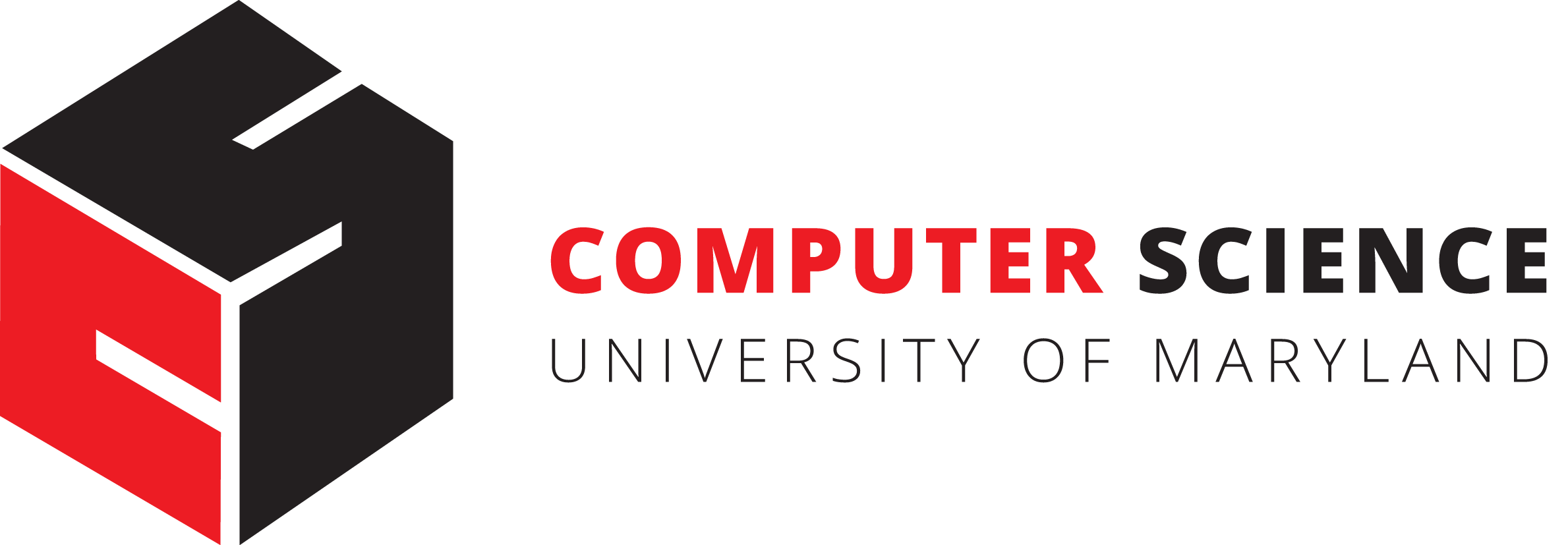CMSC828M – Spring 2020
Applied Mechanism Design for Social Good

Who: John P. Dickerson and Duncan C. McElfresh
When: Tuesday and Thursday, 2:00–3:15 PM
Where: SPH 0302
Office hours: Whenever; email me first at john@cs.umd.edu
Description of Course
How do we allocate food to food banks, children to schools, organs to patients, residents to hospitals, security forces to patrol routes, and credit to multiple authors of an open source project—all in the face of competing incentives affecting selfish participants? Can we fairly divide a house, furniture, cars, and the family dog between a divorcing couple? Is Oprah going to be our next president, and—if so—why? Can we design mechanisms for these problems that perform well in practice, are computationally tractable, and whose workings and results are understandable by humans?
This course will consist primarily of reading and discussing recent papers from folks in computer science, economics, operations research, operations management, and medicine; as such, there is no assigned textbook. Some recommended high-level or reference readings follow.
| Title | Author(s) | Why? | Link |
|---|---|---|---|
| Algorithmic Game Theory | Nisan, Roughgarden, Tardos, & Vazirani | Very readable introduction to, and reference book for, game theory and mechanism design. | (It's free!) |
| Who Gets What — and Why: The New Economics of Matchmaking and Market Design | Al Roth | Pop-sci coverage of fielded matching markets like NRMP, school choice, and kidney exchange, from somebody who won a Nobel Prize for his part in their design. | (Amazon) |
| Handbook of Computational Social Choice | Brandt, Conitzer, Enriss, Lang, & Procaccia | Good and very recent overview of recent theory and practice in social choice. | (It's free! password: cam1CSC) |
| Combinatorial Auctions | Cramton, Shoham, & Steinberg | Fairly recent and very readable overview of modern approaches to auction design. | (It's free!) |
| The Ethical Algorithm | Kearns & Roth | Recent and very readable overview of privacy, bias, fairness, and other societal concerns in algorithm design. | (Oxford University Press) |
| A Modern Introduction to Online Learning | Orabona | Very recent tutorial on online learning & convex optimization. | (It's free!) |
Requirements
Students enrolled in the course will complete a semester-long course project on something related to market and mechanism design. This project can be done individually or—preferably—in a small group, and can be entirely theoretical, entirely applied, or anything in between. The goal here is to create something that is either immediately publishable or will lead to a publishable piece of work in the future. Project proposals will be due in early March, with two classes at the end of the semester set aside for individual and group presentations, if the class is small enough to accommodate that. There will also be a brief (2-page) "project check-up" document due in early April, to ensure progress is being made. A whitepaper—formatted as a conference paper—will be due by the exam date for this course (Monday, May 14 at 8:00AM). Examples of projects from recent years that developed into full papers:
- Faez Ahmed, John P Dickerson, and Mark Fuge. "Diverse Weighted Bipartite b-Matching." IJCAI-2017. (arXiv)
- Zhoushu Li, Neal Gupta, Sanmay Das, and John P Dickerson. "Equilibrium Behavior in Competing Dynamic Matching Markets." IJCAI-2018.
- Duncan McElfresh and John P Dickerson. "Balancing Lexicographic Fairness and a Utilitarian Objective with Application to Kidney Exchange." AAAI-2018. (arXiv)
- Elissa M Redmiles, Michelle L Mazurek, John P Dickerson. "Dancing Pigs or Externalities? Measuring the Rationality of Security Decisions." EC-2018.
- Candice Schumann, Samsara N Counts, Jeffrey Foster, and John P Dickerson. "The Diverse Cohort Selection Problem: Multi-Armed Bandits with Varied Pulls." AAMAS-19. (arXiv)
- Candice Schumann, Zhi Lang, Jeffrey Foster, and John P Dickerson. "Making the Cut: A Bandit-based Approach to Tiered Interviewing." NeurIPS-19. (arXiv)
Students will present or scribe/summarize during the semester (assuming roughly 50 students, this should be feasible). Presenting in class is just that—spending 30 or so minutes presenting to the class on the required reading for that day. Some classes will start with John or Duncan lecturing for 30–45 minutes followed by one student, or will consist of two students lecturing. Alternatively, with so many students in the course, some students may also choose to write a summary of one of the lecture readings that is fit to be published on the course website. We'll also post the student presentation (either slides or notes) online. You'll be able to select a topic to lecture on, or you can sell me on your own.
Finally, many students expressed interest in this course counting toward MS/PhD qualifiers; with that in mind, students enrolled in the course will have a 24-hour take-home midterm and a 48-hour take-home final; the former will occur sometime in early April, and the latter will be taken at the student's discretion at any time after the final lecture and before (48 hours before) the exam date for this course (Monday, May 18 at 10:30AM).
Final grades will be calculated as:
- 5% course project proposal
- 5% course project checkup
- 50% course project writeup
- 10% scribing/summarizing a paper
30% examinations (student-favoring split of either 10% midterm/20% final or 15% midterm/15% final).Due to COVID-19, exams are canceled. In lieu of this, I will apply a baseline 30% to every student's grade.
This course is aimed at Ph.D. students, but should be accessible to M.Sc. and B.Sc. students with some degree of mathematical maturity and an interest in applied mechanism design. If in doubt, e-mail me: john@cs.umd.edu!
Schedule
| # | Date | Topic | Reading | Slides | Lecturer | Notes |
|---|---|---|---|---|---|---|
| 1 | 1/28 | Introduction | Alvin E. Roth. The economist as engineer: Game theory, experimentation, and computation as tools for design economics. Econometrica, 2002. | pdf, pptx | Dickerson | |
| Part I: The Basics of Game Theory and Mechanism Design | ||||||
| 2 | 1/30 | Intro to Game Theory | Chapters 1 and 2 of Algorithmic Game Theory. | pdf, pptx | Dickerson | |
| 3 | 2/4 | Intro to Game Theory, Continued | Chapter 3 of Algorithmic Game Theory. | pdf, pptx | Dickerson | |
| 4 | 2/6 | Intro to Mechanism Design | Chapters 9 and 10 of Algorithmic Game Theory. | pdf, pptx | Dickerson | |
| 5 | 2/11 | Voting Theory: Voting Rules | Zwicker’s Chapter "Introduction to the Theory of Voting" from the Handbook of Computational Social Choice | Pacuit | John is at AAAI | |
| 6 | 2/13 | Voting Theory: Impossibility Results & Strategic Voting | Eric Pacuit's article on "Voting Methods" in the Stanford Encyclopedia of Philosophy. | Pacuit | ||
| 7 | 2/18 | Intro to Mechanism Design, Continued | — | pdf, pptx | Dickerson | |
| 8 | 2/20 | Intro to Mechanism Design, Continued, & Primer in Combinatorial Optimization | Chapters 5 and 6 of Luca Trevisan's "Combinatorial Optimization: Exact and Approximate Algorithms" | pdf, pptx | Dickerson | |
| 9 | 2/25 | Primer in Combinatorial Optimization, Continued | Cornuéjols, Trick, and Saltzman. A Tutorial on Integer Programming. 1995. | pdf, pptx | Dickerson | |
| 10 | 2/27 | Stochastic Games & Primer on Markov Decision Processes (MDPs) | — | pdf, pptx | Dickerson | |
| 11 | 3/3 | Stochastic Games & Primer on Markov Decision Processes (MDPs) | — | pdf, pptx | Dickerson | |
| 12 | 3/5 | Stochastic Games & Primer on Markov Decision Processes (MDPs) | — | pdf, pptx | Dickerson | |
| Part II: Practical Applications of Mechanism Design | ||||||
| 13 | 3/10 | Security Games | Kiekintveld et al. Computing optimal randomized resource allocations for massive security games. AAMAS, 2009. | pdf, pptx | Dickerson | |
| 14 | 3/12 | Green Security Games | pdf, pptx | Dickerson | Fei Fang's website | |
| – | 3/17 | Spring Break | — | — | — | |
| – | 3/19 | Spring Break | — | — | — | |
| – | 3/24 | Coronavirus Break | University-wide cancellation of classes due to COVID-19; please use this time to work on your projects, & reach out to John, your group, and others on Slack. | — | — | Stay safe! |
| – | 3/26 | Coronavirus Break | University-wide cancellation of classes due to COVID-19; please use this time to work on your projects, & reach out to John, your group, and others on Slack. | — | — | Stay safe! |
| 15 | 3/31 | Stable Matching I | Roth and Peranson. The Redesign of the Matching Market for American Physicians: Some Engineering Aspects of Economic Design. American Economic Review, 1999. | pdf, pptx | Dickerson | First video lecture! I'll be posting recordings on ELMS in the "Files" directory. |
| 16 | 4/2 | Stable Matching II & National Residency Matching Program | Bertsimas, Farias, and Trichakis. Fairness, Efficiency, and Flexibility in Organ Allocation for Kidney Transplantation. Operations Research, 2013. | pdf, pptx | Dickerson | |
| 17 | 4/7 | Incentives & Matching I | pdf, pptx | Dickerson | ||
| 18 | 4/9 | Incentives & Matching II: Organ Exchange | Blum et al. Opting Into Optimal Matchings. SODA, 2017. | pdf, pptx | Dickerson | |
| 19 | 4/14 | Organ Exchange: Batch Optimization | pdf, pptx | Dickerson | ||
| 20 | 4/16 | Organ Exchange: Dynamic Optimization | Dickerson and Sandholm. FutureMatch: Combining Human Value Judgments and Machine Learning to Match in Dynamic Environments. AAAI, 2015. | pdf, pptx | Dickerson | |
| 21 | 4/21 | What is "Best": Active Preference Elicitation (Theory) | Vayanos et al. Active Preference Elicitation via Adjustable Robust Optimization. Working paper, 2020. | pdf, key | McElfresh | |
| 22 | 4/23 | What is "Best": Active Preference Elicitation (Optimization) | Boyd & Vandenberghe. Convex Optimization, 2009. | pdf, key | McElfresh | Please send in your project updates by Friday night (4/24)! |
| 23 | 4/28 | Fair Division |
|
pdf, pptx | Dickerson | Wharton's Course Match website |
| 24 | 4/30 | Fair Division & Combinatorial Assignment Problems | pdf, pptx | Dickerson | ||
| 25 | 5/5 | Incentive Auctions & Spectrum Repacking | pdf, pptx | Dickerson | Priceonomics blog post | |
| 26 | 5/7 | Differentiable Economics: Deep Learning for Mechanism Design | Curry | Differentiable convex optimization layers: link | ||
| 27 | 5/12 | TBD | Dickerson | Last class! | ||
| Due to COVID-19, there will be no final exam. | ||||||
